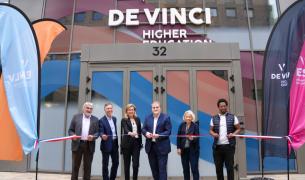
Alessandro Biancalani graduated in Physics at Scuola Normale Superiore in Pise, Italy, in 2005, then he entered a PhD program in Applied Physics at the University of Pise (supervisor: Prof. Francesco Pegoraro) in collaboration with ENEA-Frascati, Italy (co-supervisor: Prof. Fulvio Zonca) and University of California of Irvine, USA (co-supervisor: Prof. Liu Chen), defending his PhD thesis in 2010. He also got a Habilitation to Direct the Research (HDR) at the Sorbonne University in Paris, France, in 2019. Before joining the ESILV, he has worked at the Max-Planck Institute for Plasma Physics in Garching, Germany in collaboration with the Max-Planck Institute for Solar System Research. His main research interests include the theoretical investigation of waves, instabilities, and turbulence in plasmas, in particular in magnetic-confinement fusion experiments. For more infos, please see the personal page: www.biancalani.org.
alessandro.biancalani@devinci.fr
Alessandro Biancalani; Alberto Bottino; Daniele Del Sarto; Matteo Valerio Falessi; Thomas Hayward-Schneider; Philipp Lauber; Alexey Mishchenko; Brando Rettino; Juvert Njeck Sama; Francesco Vannini; Laurent Villard; Xin Wang; Fulvio Zonca
Nonlinear interaction of Alfvénic instabilities and turbulence via the modification of the equilibrium profiles Article de journal
Dans: Journal Of Plasma Physics, vol. 89, no. 6, p. 905890602, 2023.
@article{biancalani_2738,
title = {Nonlinear interaction of Alfvénic instabilities and turbulence via the modification of the equilibrium profiles},
author = {Alessandro Biancalani and Alberto Bottino and Daniele Del Sarto and Matteo Valerio Falessi and Thomas Hayward-Schneider and Philipp Lauber and Alexey Mishchenko and Brando Rettino and Juvert Njeck Sama and Francesco Vannini and Laurent Villard and Xin Wang and Fulvio Zonca},
url = {https://doi.org/10.1017/S0022377823001137},
year = {2023},
date = {2023-12-01},
journal = {Journal Of Plasma Physics},
volume = {89},
number = {6},
pages = {905890602},
abstract = {Nonlinear simulations of Alfvén modes (AMs) driven by energetic particles (EPs) in
the presence of turbulence are performed with the gyrokinetic particle-in-cell code
ORB5. The AMs carry a heat flux, and consequently they nonlinearly modify the
plasma temperature profiles. The isolated effect of this modification on the dynamics
of turbulence is studied by means of electrostatic simulations. We find that turbulence
is reduced when the profiles relaxed by the AM are used, with respect to the simulation
where the unperturbed profiles are used. This is an example of indirect interaction of
EPs and turbulence. First, an analytic magnetic equilibrium with circular concentric flux
surfaces is considered as a simplified example for this study. Then, an application to an
experimentally relevant case of ASDEX Upgrade is discussed.},
keywords = {},
pubstate = {published},
tppubtype = {article}
}
Brando Rettino; Thomas Hayward-Schneider; Alessandro Biancalani; Alberto Bottino; Philipp Lauber; Markus Weiland; Francesco Vannini; Frank Jenko
Gyrokinetic modelling of non-linear interaction of Alfvén waves and EGAMs in ASDEX-Upgrade Article de journal
Dans: Nuclear Fusion, vol. 63, no. 12, p. 126051, 2023.
@article{rettino_2737,
title = {Gyrokinetic modelling of non-linear interaction of Alfvén waves and EGAMs in ASDEX-Upgrade},
author = {Brando Rettino and Thomas Hayward-Schneider and Alessandro Biancalani and Alberto Bottino and Philipp Lauber and Markus Weiland and Francesco Vannini and Frank Jenko},
url = {https://doi.org/10.1088/1741-4326/ad0506},
year = {2023},
date = {2023-11-01},
journal = {Nuclear Fusion},
volume = {63},
number = {12},
pages = {126051},
abstract = {Energetic particle (EP) dynamics and excitation of EP driven instabilities is an important topic
of study for the physics of fusion reactors. In this paper we consider EPs injected in the plasma
by neutral beams at high energies to heat it. EP species exist far from thermal equilibrium in the
form of anisotropic non-Maxwellian distribution functions. EP driven modes, such as Alfvén
waves (AWs) and EP driven geodesic acoustic modes (EGAMs), can redistribute EPs in
phase-space and harm confinement. We examine the effects of experimental-like anisotropic EP
distribution functions on the excitation and the non-linear coupling of such instabilities with the
gyrokinetic particle-in-cell code ORB5. The growth rate of EGAMs is found to be sensitively
dependent on the phase-space shape of the distribution function as well as on the non-linear
wave-wave coupling with AWs. Experimental findings are compared with numerical results.},
keywords = {},
pubstate = {published},
tppubtype = {article}
}
Juvert Njeck Sama; Alessandro Biancalani; Alberto Bottino; I Chavdarovski; Daniele Del Sarto; A Ghizzo; Thomas Hayward-Schneider; Philipp Lauber; B Rettino; Francesco Vannini
Effect of temperature anisotropy on the dynamics of geodesic acoustic modes Article de journal
Dans: Journal Of Plasma Physics, vol. 89, no. 1, p. 905890109, 2023.
@article{sama_2301,
title = {Effect of temperature anisotropy on the dynamics of geodesic acoustic modes},
author = {Juvert Njeck Sama and Alessandro Biancalani and Alberto Bottino and I Chavdarovski and Daniele Del Sarto and A Ghizzo and Thomas Hayward-Schneider and Philipp Lauber and B Rettino and Francesco Vannini},
url = {https://www.cambridge.org/core/journals/journal-of-plasma-physics/article/abs/effect-of-temperature-anisotropy-on-the-dynamics-of-geodesic-acoustic-modes/B3084D49F9505CDF3AA53221EE074E46},
year = {2023},
date = {2023-08-01},
journal = {Journal Of Plasma Physics},
volume = {89},
number = {1},
pages = {905890109},
abstract = {In this work, we revisit the linear gyro-kinetic theory of geodesic acoustic modes (GAMs) and derive a general dispersion relation for an arbitrary equilibrium distribution function of ions. A bi-Maxwellian distribution of ions is then used to study the effects of ion temperature anisotropy on GAM frequency and growth rate. We find that ion temperature anisotropy yields sensible modifications to both the GAM frequency and growth rate as both tend to increase with anisotropy and these results are strongly affected by the electron to ion temperature ratio.},
keywords = {},
pubstate = {published},
tppubtype = {article}
}
Alexey Mishchenko; Alessandro Biancalani; Juvert Njeck Sama; Alberto Bottino; Sergio Briguglio; M Borchardt; Emanuele Poli; Remi Dumont; Jorge Ferreira; J P Graves; Ralf Kleiber; B Rettino; Thomas Hayward-Schneider; Axel Koenies; Emmanuel Lanti; Philipp Lauber; H Leyh; Zhixin Lu; Hinrich Luetjens; Ben McMillan; Martin Campos Pinto; Baruch Rofman; Christoph Slaby; Francesco Vannini; Laurent Villard; Gregorio Vlad; Xin Wang; Fabien Widmer; Fulvio Zonca
Numerical tools for burning plasmas Article de journal
Dans: Plasma Physics And Controlled Fusion, vol. 65, no. 6, p. 064001, 2023.
@article{mishchenko_2378,
title = {Numerical tools for burning plasmas},
author = {Alexey Mishchenko and Alessandro Biancalani and Juvert Njeck Sama and Alberto Bottino and Sergio Briguglio and M Borchardt and Emanuele Poli and Remi Dumont and Jorge Ferreira and J P Graves and Ralf Kleiber and B Rettino and Thomas Hayward-Schneider and Axel Koenies and Emmanuel Lanti and Philipp Lauber and H Leyh and Zhixin Lu and Hinrich Luetjens and Ben McMillan and Martin Campos Pinto and Baruch Rofman and Christoph Slaby and Francesco Vannini and Laurent Villard and Gregorio Vlad and Xin Wang and Fabien Widmer and Fulvio Zonca},
url = {https://iopscience.iop.org/article/10.1088/1361-6587/acce68},
year = {2023},
date = {2023-04-01},
journal = {Plasma Physics And Controlled Fusion},
volume = {65},
number = {6},
pages = {064001},
abstract = {The software stack under development within a European coordinated effort on tools for burning plasma modelling is presented. The project is organised as a Task (TSVV Task 10) under the new E-TASC initiative (Litaudon et al 2022 Plasma Phys. Control. Fusion64 034005). This is a continued effort within the EUROfusion inheriting from the earlier European coordination projects as well as research projects based at various European laboratories. The ongoing work of the TSVV Tasks is supported by the Advanced Computing Hubs. Major projects requiring the high performance computing (HPC) resources are global gyrokinetic codes and global hybrid particle-magnetohydrodynamics (MHD) codes. Also applications using the integrated modelling tools, such as the Energetic-Particle Workflow, based on the ITER Integrated Modelling & Analysis Suite (IMAS), or the code package for modelling radio-frequency heating and fast-ion generation may require intensive computation and a substantial memory footprint. The continual development of these codes both on the physics side and on the HPC side allows us to tackle frontier problems, such as the interaction of turbulence with MHD-type modes in the presence of fast particles. One of the important mandated outcomes of the E-TASC project is the IMAS-enabling of EUROfusion codes and release of the software stack to the EUROfusion community.},
keywords = {},
pubstate = {published},
tppubtype = {article}
}
Alberto Bottino; Matteo Valerio Falessi; Thomas Hayward-Schneider; Alessandro Biancalani; Sergio Briguglio; R Hatzky; Philipp Lauber; Alexey Mishchenko; Emanuele Poli; B Rettino; Francesco Vannini; Xin Wang; Fulvio Zonca
Time evolution and finite element representation of Phase Space Zonal Structures in ORB5 Article de journal
Dans: Journal of Physics: Conference Series, vol. 2397, p. 012019, 2022.
@article{bottino_2298,
title = {Time evolution and finite element representation of Phase Space Zonal Structures in ORB5},
author = {Alberto Bottino and Matteo Valerio Falessi and Thomas Hayward-Schneider and Alessandro Biancalani and Sergio Briguglio and R Hatzky and Philipp Lauber and Alexey Mishchenko and Emanuele Poli and B Rettino and Francesco Vannini and Xin Wang and Fulvio Zonca},
url = {https://dx.doi.org/10.1088/1742-6596/2397/1/012019},
year = {2022},
date = {2022-12-01},
journal = {Journal of Physics: Conference Series},
volume = {2397},
pages = {012019},
abstract = {Phase Space Zonal Structures (PSZSs), obtained by averaging out dependencies on angle-like variables in the energetic particle (EP) distribution function, play a fundamental role in regulating EP transport induced by Alfvén instabilities in burning plasmas, acting as a slowly varying nonlinear equilibrium state. Therefore, they are of great interest for the development of reduced models for the description of EP heat and particle transport on long time scales, comparable with the energy confinement time, for future burning plasma experiments. In this work, we propose an efficient finite element based projection of the time evolution of the PSZS, suited for global particle-in-cell (PIC) gyrokinetic (GK) codes. The resulting algorithm has been implemented in the global GK PIC code ORB5. PSZSs can not only be used for validating reduced models, but also as a diagnostic tool for characterizing the nonlinear interaction in phase space between Alfvén instabilities and EPs in global GK simulations.},
keywords = {},
pubstate = {published},
tppubtype = {article}
}
Francesco Vannini; Alessandro Biancalani; Alberto Bottino; Thomas Hayward-Schneider; Philipp Lauber; Alexey Mishchenko; Emanuele Poli; B Rettino; Gregorio Vlad; Xin Wang; ASPEX Upgrade Team
Gyrokinetic modelling of the Alfvén mode and EGAM activity in ASDEX Upgrade Article de journal
Dans: Journal of Physics: Conference Series, vol. 2397, p. 012003, 2022.
@article{vannini_2300,
title = {Gyrokinetic modelling of the Alfvén mode and EGAM activity in ASDEX Upgrade},
author = {Francesco Vannini and Alessandro Biancalani and Alberto Bottino and Thomas Hayward-Schneider and Philipp Lauber and Alexey Mishchenko and Emanuele Poli and B Rettino and Gregorio Vlad and Xin Wang and ASPEX Upgrade Team},
url = {https://dx.doi.org/10.1088/1742-6596/2397/1/012003},
year = {2022},
date = {2022-12-01},
journal = {Journal of Physics: Conference Series},
volume = {2397},
pages = {012003},
abstract = {Energetic particles present in tokamak machines can drive through resonant wave-particle interaction different plasma instabilities, e.g Alfvén modes and energetic particle-driven geodesic acoustic modes (EGAMs). While the former are potentially detrimental as they can enhance the energetic particle transport and damage the machine wall, the latter are axisymmetric, possibly benign modes that can act to regulate turbulence. A unique scenario, the so-called NLED-AUG case, has been developed in ASDEX Upgrade by tuning the plasma parameters so that the energetic particle kinetic energy is 100 times higher than that of the background plasma, like in ITER. An intense energetic particle-driven activity is observed, most prominently various Alfvén mode bursts triggering chirping EGAMs. The present work reports studies on the Alfvén mode and EGAM dynamics showing, for the first time, many toroidal mode gyrokinetic simulations with ORB5 where the NLED-AUG case scenario is considered. We study the mode dynamics modelling the energetic particles with different equilibrium distribution functions, such as: isotropic slowing-down, double-bump-on-tail and equivalent Maxwellian. We retain, at the beginning, the nonlinearities only in the energetic particle dynamics. Later, also the background plasma species nonlinearities are taken into account.},
keywords = {},
pubstate = {published},
tppubtype = {article}
}
Francesco Vannini; Alessandro Biancalani; Alberto Bottino; Thomas Hayward-Schneider; Philipp Lauber; Alexey Mishchenko; Emanuele Poli; B Rettino; Gregorio Vlad; Xin Wang; ASPEX Upgrade Team
Gyrokinetic modelling of the Alfvén mode activity in ASDEX Upgrade with an isotropic slowing-down fast-particle distribution Article de journal
Dans: Nuclear Fusion, vol. 62, no. 12, p. 126042, 2022.
@article{vannini_2299,
title = {Gyrokinetic modelling of the Alfvén mode activity in ASDEX Upgrade with an isotropic slowing-down fast-particle distribution},
author = {Francesco Vannini and Alessandro Biancalani and Alberto Bottino and Thomas Hayward-Schneider and Philipp Lauber and Alexey Mishchenko and Emanuele Poli and B Rettino and Gregorio Vlad and Xin Wang and ASPEX Upgrade Team},
url = {https://dx.doi.org/10.1088/1741-4326/ac8b1e},
year = {2022},
date = {2022-11-01},
journal = {Nuclear Fusion},
volume = {62},
number = {12},
pages = {126042},
abstract = {In the present paper, the evolution of the Alfvén modes (AMs) is studied in a realistic ASDEX Upgrade equilibrium by analyzing the results of simulations with the global, electromagnetic, gyrokinetic particle-in-cell code ORB5. The energetic particles (EPs) are modelled both via the newly implemented isotropic slowing-down and with Maxwellian distribution functions. The comparison of the numerical results shows that modelling the EPs with the equivalent Maxwellian rather than with the slowing-down, does not significantly affect the frequency of the driven AM, while its growth rate appears to be underestimated with a quantitative difference as large as almost 30%. Additionally the choice of the isotropic slowing-down allows a better description of the nonlinear modification of the dominant AM frequency, while an equivalent Maxwellian underestimates it. A good comparison with the experimental spectrogram is found.},
keywords = {},
pubstate = {published},
tppubtype = {article}
}
Alexey Mishchenko; Alberto Bottino; Thomas Hayward-Schneider; Emanuele Poli; Xin Wang; C Nührenberg; Alessandro Biancalani; E Lanti; Philipp Lauber; R Hatzky; Francesco Vannini; Laurent Villard; F Widmer; R Keiber
Gyrokinetic particle-in-cell simulations of electromagnetic turbulence in the presence of fast particles and global modes Article de journal
Dans: Plasma Physics And Controlled Fusion, vol. 64, no. 10, p. 104009, 2022.
@article{mishchenko_2296,
title = {Gyrokinetic particle-in-cell simulations of electromagnetic turbulence in the presence of fast particles and global modes},
author = {Alexey Mishchenko and Alberto Bottino and Thomas Hayward-Schneider and Emanuele Poli and Xin Wang and C Nührenberg and Alessandro Biancalani and E Lanti and Philipp Lauber and R Hatzky and Francesco Vannini and Laurent Villard and F Widmer and R Keiber},
url = {https://dx.doi.org/10.1088/1361-6587/ac8dbc},
year = {2022},
date = {2022-09-01},
journal = {Plasma Physics And Controlled Fusion},
volume = {64},
number = {10},
pages = {104009},
abstract = {Global simulations of electromagnetic turbulence in circular-flux-surface tokamak and ASDEX-Upgrade geometry, tearing instabilities and their combination with the electromagnetic turbulence, nonlinear Alfvénic modes in the presence of fast particles and their combination with the electromagnetic turbulence and global electromagnetic turbulence in Wendelstein 7-X stellarator geometry are carried out using the gyrokinetic particle-in-cell code ORB5 (Lanti et al 2020 Comp. Phys. Comm. 251 107072) and EUTERPE (Kornilov et al 2004 Phys. Plasmas 11 3196). Computational feasibility of simulating such complex coupled systems is demonstrated. For simplicity, the reduced mass ratio is used throughout the paper.},
keywords = {},
pubstate = {published},
tppubtype = {article}
}
Mohsen Sadr; Alexey Mishchenko; Thomas Hayward-Schneider; Axel Koenies; Alberto Bottino; Alessandro Biancalani; Emmanuel Lanti; Laurent Villard
Linear and nonlinear excitation of TAE modes by external electromagnetic perturbations using ORB5 Article de journal
Dans: Plasma Physics And Controlled Fusion, vol. 64, no. 8, p. 085010, 2022.
@article{sadr_2736,
title = {Linear and nonlinear excitation of TAE modes by external electromagnetic perturbations using ORB5},
author = {Mohsen Sadr and Alexey Mishchenko and Thomas Hayward-Schneider and Axel Koenies and Alberto Bottino and Alessandro Biancalani and Emmanuel Lanti and Laurent Villard},
url = {https://doi.org/10.1088/1361-6587/ac73eb},
year = {2022},
date = {2022-07-01},
journal = {Plasma Physics And Controlled Fusion},
volume = {64},
number = {8},
pages = {085010},
abstract = {The excitation of toroidicity-induced Alfvén eigenmodes (TAEs) using prescribed external
electromagnetic perturbations (hereafter ?antenna') acting on a confined toroidal plasma, as well
as its nonlinear couplings to other modes in the system, is studied. The antenna is described by
an electrostatic potential resembling the target TAE mode structure along with its corresponding
parallel electromagnetic potential computed from Ohm's law. Numerically stable long-time
linear simulations are achieved by integrating the antenna within the framework of a mixed
representation and pullback scheme (Mishchenko et al 2019 Comput. Phys. Commun. 238 194).
By decomposing the plasma electromagnetic potential into symplectic and Hamiltonian parts
and using Ohm's law, the destabilizing contribution of the potential gradient parallel to the
magnetic field is cancelled in the equations of motion. Besides evaluating the frequencies and
the growth/damping rates of excited modes compared to referenced TAEs, we study the
interaction of antenna-driven modes with fast particles and indicate their margins of instability.
Furthermore, we show the first nonlinear simulations in the presence of a TAE-like antenna
exciting other TAE modes, as well as global Alfvén eigenmodes with different toroidal wave
numbers from that of the antenna.},
keywords = {},
pubstate = {published},
tppubtype = {article}
}
Özgür Gürcan; Johan Anderson; Sara Moradi; Alessandro Biancalani; Pierre Morel
Phase and amplitude evolution in the network of triadic interactions of the Hasegawa-Wakatani system Article de journal
Dans: Physics Of Plasmas, vol. 29, no. 5, p. 052306, 2022.
@article{gurcan_1825,
title = {Phase and amplitude evolution in the network of triadic interactions of the Hasegawa-Wakatani system},
author = {Özgür Gürcan and Johan Anderson and Sara Moradi and Alessandro Biancalani and Pierre Morel},
url = {https://aip.scitation.org/doi/10.1063/5.0089073},
year = {2022},
date = {2022-05-01},
journal = {Physics Of Plasmas},
volume = {29},
number = {5},
pages = {052306},
abstract = {The Hasegawa-Wakatani system, commonly used as a toy model of dissipative drift waves in fusion devices, is revisited with considerations
of phase and amplitude dynamics of its triadic interactions. It is observed that a single resonant triad can saturate via three way phase
locking, where the phase differences between dominant modes converge to constant values as individual phases increase in time. This allows
the system to have approximately constant amplitude solutions. Non-resonant triads show similar behavior only when one of its legs is a
zonal wave number. However, when an additional triad, which is a reflection of the original one with respect to the y axis is included, the
behavior of the resulting triad pair is shown to be more complex. In particular, it is found that triads involving small radial wave numbers
(large scale zonal flows) end up transferring their energy to the subdominant mode which keeps growing exponentially, while those involving
larger radial wave numbers (small scale zonal flows) tend to find steady chaotic or limit cycle states (or decay to zero). In order to study the
dynamics in a connected network of triads, a network formulation is considered, including a pump mode, and a number of zonal and non-
zonal subdominant modes as a dynamical system. It was observed that the zonal modes become clearly dominant only when a large number
of triads are connected. When the zonal flow becomes dominant as a ?collective mean field,? individual interactions between modes become
less important, which is consistent with the inhomogeneous wave-kinetic picture. Finally, the results of direct numerical simulation are dis-
cussed for the same parameters, and various forms of the order parameter are computed. It is observed that nonlinear phase dynamics results
in a flattening of the large scale phase velocity as a function of scale in direct numerical simulations.},
keywords = {},
pubstate = {published},
tppubtype = {article}
}
B Rettino; Thomas Hayward-Schneider; Alessandro Biancalani; Alberto Bottino; I Chavdarovski; M Weiland; Francesco Vannini; F Jenko; Philipp Lauber
Gyrokinetic modeling of anisotropic energetic particle driven instabilities in tokamak plasmas Article de journal
Dans: Nuclear Fusion, vol. 62, no. 7, p. 076027, 2022.
@article{rettino_2297,
title = {Gyrokinetic modeling of anisotropic energetic particle driven instabilities in tokamak plasmas},
author = {B Rettino and Thomas Hayward-Schneider and Alessandro Biancalani and Alberto Bottino and I Chavdarovski and M Weiland and Francesco Vannini and F Jenko and Philipp Lauber},
url = {https://dx.doi.org/10.1088/1741-4326/ac6680},
year = {2022},
date = {2022-05-01},
journal = {Nuclear Fusion},
volume = {62},
number = {7},
pages = {076027},
keywords = {},
pubstate = {published},
tppubtype = {article}
}
Gregorio Vlad; Xin Wang; Francesco Vannini; Sergio Briguglio; Nakia Carlevaro; Matteo Valerio Falessi; Giuliana Fogaccia; Valeria Fusco; Fulvio Zonca; Alessandro Biancalani; Alberto Bottino; Thomas Hayward-Schneider; Philipp Lauber
A linear benchmark between HYMAGYC, MEGA and ORB5 codes using the NLED-AUG test case to study Alfvénic modes driven by energetic particles Article de journal
Dans: Nuclear Fusion, vol. 61, no. 1, p. 116026, 2021.
@article{vlad_1713,
title = {A linear benchmark between HYMAGYC, MEGA and ORB5 codes using the NLED-AUG test case to study Alfvénic modes driven by energetic particles},
author = {Gregorio Vlad and Xin Wang and Francesco Vannini and Sergio Briguglio and Nakia Carlevaro and Matteo Valerio Falessi and Giuliana Fogaccia and Valeria Fusco and Fulvio Zonca and Alessandro Biancalani and Alberto Bottino and Thomas Hayward-Schneider and Philipp Lauber},
url = {https://doi.org/10.1088/1741-4326/ac2522},
year = {2021},
date = {2021-11-01},
journal = {Nuclear Fusion},
volume = {61},
number = {1},
pages = {116026},
abstract = {One of the major challenges in magnetic confinement thermonuclear fusion research concerns
the confinement of the energetic particles (EPs) produced by fusion reactions and/or by
additional heating systems. In such experiments, EPs can resonantly interact with the shear
Alfvén waves. In the frame of the EUROfusion 2019-2020 Enabling Research project
?multi-scale energetic particle transport in fusion devices' (MET), a detailed benchmark
activity has been undertaken among few of the state-of-the-art codes available to study the
self-consistent interaction of an EP population with the shear Alfvén waves. In this paper
linear studies of EP driven modes with toroidal mode number n = 1 will be presented, in real
magnetic equilibria and in regimes of interest for the forthcoming generation devices (e.g.
ITER, JT-60SA, DTT). The codes considered are HYMAGYC, MEGA, and ORB5, the first
two being hybrid MHD-gyrokinetic codes (bulk plasma is represented by MHD equations,
while the EP species is treated using the gyrokinetic formalism), the third being a global
electromagnetic gyrokinetic code. The so-called NLED-AUG reference case has been
considered, both for the peaked on-axis and peaked off-axis EP density profile cases, using its
shaped cross section version. Comparison of the spatial mode structure, growth rate and real
frequency of the modes observed will be considered in detail. The dependence of mode
characteristics when several parameters are varied, as, e.g. the ratio between EP and bulk ion
density and EP temperature, will be presented. A remarkable agreement is observed among the
three codes for the peaked off-axis case, obtaining all of them a TAE localized close to the
magnetic axis. On the other hand, some differences are observed when considering the peaked
on-axis case, where two modes are observed (a TAE localized in the radial external region, and
an RSAE around mid-radius). A careful analysis of the stability of this equilibrium, in
particular by varying self-consistently the EP drive, will allow to reconcile the results of the
three codes.},
keywords = {},
pubstate = {published},
tppubtype = {article}
}
Francesco Vannini; Alessandro Biancalani; Alberto Bottino; Thomas Hayward-Schneider; Philipp Lauber; Alexey Mishchenko; Ivan Novikau; Emanuele Poli
Gyrokinetic investigation of the damping channels Alfven modes in ASDEX Upgrade Article de journal
Dans: Physics Of Plasmas, vol. 27, no. 4, p. 042501, 2020.
@article{vannini_2790,
title = {Gyrokinetic investigation of the damping channels Alfven modes in ASDEX Upgrade},
author = {Francesco Vannini and Alessandro Biancalani and Alberto Bottino and Thomas Hayward-Schneider and Philipp Lauber and Alexey Mishchenko and Ivan Novikau and Emanuele Poli},
url = {https://doi.org/10.1063/1.5134979},
year = {2020},
date = {2020-04-01},
journal = {Physics Of Plasmas},
volume = {27},
number = {4},
pages = {042501},
abstract = {The linear destabilization and nonlinear saturation of energetic-particle driven Alfv enic instabilities in tokamaks strongly depend on the
damping channels. In this work, the collisionless damping mechanisms of Alfv enic modes are investigated within a gyrokinetic framework
by means of global simulations with the particle-in-cell code ORB5 and compared with the eigenvalue code LIGKA and reduced models. In
particular, the continuum damping and the Landau damping (of ions and electrons) are considered. The electron Landau damping is found
to be dominant compared to the ion Landau damping for experimentally relevant cases. As an application, the linear and nonlinear dynamics
of toroidicity induced Alfv en eigenmodes and energetic-particle driven modes in ASDEX Upgrade is investigated theoretically and compared
with experimental measurements.},
keywords = {},
pubstate = {published},
tppubtype = {article}
}
Alessandro Biancalani; Alberto Bottino; Thomas Hayward-Schneider; Philipp Lauber; Brando Rettino; Francesco Vannini; Xin Wang; Juvert Njeck Sama; Daniele Del Sarto; Alexey Mishchenko; Baruch Rofman; Laurent Villard; Matteo Valerio Falessi; Gregorio Vlad; Fulvio Zonca; Remi Dumont; Ben McMillan
Effect of zonal structures excited by Alfven modes, on turbulence Proceedings Article
Dans: 29th IAEA Fusion Energy Conference, London, England, 2023, ISBN: https://conferences.iaea.org/event/316/contributio.
@inproceedings{biancalani_2781,
title = {Effect of zonal structures excited by Alfven modes, on turbulence},
author = {Alessandro Biancalani and Alberto Bottino and Thomas Hayward-Schneider and Philipp Lauber and Brando Rettino and Francesco Vannini and Xin Wang and Juvert Njeck Sama and Daniele Del Sarto and Alexey Mishchenko and Baruch Rofman and Laurent Villard and Matteo Valerio Falessi and Gregorio Vlad and Fulvio Zonca and Remi Dumont and Ben McMillan},
url = {https://www.iaea.org/events/fec2023},
issn = {https://conferences.iaea.org/event/316/contributio},
year = {2023},
date = {2023-10-01},
booktitle = {29th IAEA Fusion Energy Conference},
address = {London, England},
abstract = {Tokamak plasmas often present turbulence due to the spatial gradients of density and temperature. Alfven modes (AMs) are also present, driven unstable by the energetic particle (EP) population. Both turbulence and AMs can generate zonal, i.e. axisymmetric, structures, via nonlinear interaction. The interaction of turbulence, AMs and EPs is intrinsically a multiscale problem [1,2,3].
In this work, we investigate the dynamics of zonal structures with the global gyrokinetic particle-in-cell code ORB5 [4]. Three examples of zonal structures are studied. Firstly, we show how zonal radial electric fields, force-driven by AMs [5,6], can affect the growth of ITGs [7], demonstrating the mechanism of turbulence reduction proposed in Ref. [1]. Secondly, we show how AMs can modify the equilibrium density and temperature profiles, thus affecting the turbulence drive [8]. Thirdly, we investigate the dynamics of phase space zonal structure (PSZS), obtained by averaging out dependencies on angle-like variables in the EP distribution function [9,10]. In particular, we study the excitation of PSZS by AMs, and compare with the PSZS observed in simulations where both AMs and turbulence are present.},
note = {pwd: #Fusion23},
keywords = {},
pubstate = {published},
tppubtype = {inproceedings}
}
Xin Wang; Alberto Bottino; Thomas Hayward-Schneider; Philipp Lauber; Alexey Mishchenko; Sergio Briguglio; Matteo Valerio Falessi; Fulvio Zonca; Alessandro Biancalani; Juvert Njeck Sama; Baruch Rofman; Laurent Villard
First principe gyrokinetic simulations of frequency chirping Alfven modes in fusion plasmas Proceedings Article
Dans: 29th IAEA Fusion Energy Conference, London, England, 2023, ISBN: https://www.iaea.org/sites/default/files/23/10/cn-.
@inproceedings{wang_2783,
title = {First principe gyrokinetic simulations of frequency chirping Alfven modes in fusion plasmas},
author = {Xin Wang and Alberto Bottino and Thomas Hayward-Schneider and Philipp Lauber and Alexey Mishchenko and Sergio Briguglio and Matteo Valerio Falessi and Fulvio Zonca and Alessandro Biancalani and Juvert Njeck Sama and Baruch Rofman and Laurent Villard},
url = {https://www.iaea.org/events/fec2023},
issn = {https://www.iaea.org/sites/default/files/23/10/cn-},
year = {2023},
date = {2023-10-01},
booktitle = {29th IAEA Fusion Energy Conference},
address = {London, England},
abstract = {Frequency chirping of Alfvén modes, a phenomenon observed in tokamak fusion plasmas driven by energetic particles,
can lead to significant losses of energetic particles. In this study, we employ the global gyrokinetic code ORB5 [Comp. Phys.
Comm., 251, 107072, 2020] to explore the nonlinear dynamics of non-adiabatic frequency-chirping energetic particle modes.
Our findings reveal non-perturbative characteristics of energetic particle modes that arise due to the presence of energetic
particles. Building on results from a recent study [Plasma Phys. Control. Fusion, 65, 074001, 2023], which demonstrated
that, given a fixed equilibrium and a single toroidal mode number, the frequency chirping rate is linearly proportional to the
mode saturation amplitude (as predicted by theory [Rev. Mod. Phys., 20, 015008, 2016]), we introduce new physics to further
investigate the Alfvén mode chirping mechanism. Our study indicates that zonal flow plays an important role in modulating
chirping behavior. When only the zonal flow component is included in single-n simulations, it appears that the zonal flow is
forced driven by the Alfvén mode, resulting in a reduced amplitude level in the nonlinear stage and consequently, a decreased
chirping rate. Additionally, we conducted simulations in two distinct cases: one involving a range of toroidal mode numbers
from 0 to 6, and another from 0 to 40. Comparisons were made between scenarios with and without zonal flow in each case.
Our results show that the inclusion of zonal flow suppresses frequency chirping.},
note = {pwd: #Fusion23},
keywords = {},
pubstate = {published},
tppubtype = {inproceedings}
}
Alessandro Biancalani; Alberto Bottino; Matteo Valerio Falessi; Thomas Hayward-Schneider; Philipp Lauber; Alexey Mishchenko; Francesco Vannini; Laurent Villard; Fulvio Zonca
Interaction of Alfvénic modes and turbulence via the nonlinear modification of the equilibrium profiles Proceedings Article
Dans: Europhysics Conference Abstracts, P5b.117, online, 2022, ISBN: 979-10-96389-16-2.
@inproceedings{biancalani_2217,
title = {Interaction of Alfvénic modes and turbulence via the nonlinear modification of the equilibrium profiles},
author = {Alessandro Biancalani and Alberto Bottino and Matteo Valerio Falessi and Thomas Hayward-Schneider and Philipp Lauber and Alexey Mishchenko and Francesco Vannini and Laurent Villard and Fulvio Zonca},
url = {http://ocs.ciemat.es/EPS2022PAP/html/author.html},
issn = {979-10-96389-16-2},
year = {2022},
date = {2022-07-01},
booktitle = {Europhysics Conference Abstracts, P5b.117},
address = {online},
abstract = {A key step towards the achievement of controlled nuclear fusion in magnetic confinement
devices is the mitigation of turbulence. Turbulent tokamak plasmas are intrinsically multiscale
systems. Microturbulence generates meso-scale zonal flows. Additionally, energetic particles
drive Alfvénic modes (AM) unstable, on meso- or macro-scales, and zonal structures.
In this work, we investigate the possible interaction of AMs and turbulence via the evolution
of the equilibrium profiles. Turbulence is known to strongly depend on the gradients of the
equilibrium profiles, for example plasma density and temperature. AMs can nonlinearly modify
the equilibrium profiles [1, 2, 3], and therefore affect turbulence. Viceversa, with the same
mechanism, turbulence can affect the AM dynamics.
We present results obtained by means of global gyrokinetic simulations with the particle-in-
cell code ORB5 [4]. In recent simulations with ORB5, AMs have been shown to carry substan-
tial heat and particle fluxes [5, 6]. Here, we extend that analysis by showing how the profile
modification due to those fluxes can affect turbulence.
References
[1] L. Chen and F. Zonca, Rev. Mod. Phys. 88, 015008 (2016)
[2] M. V. Falessi and F. Zonca, Phys. Plasmas 26, 022305 (2019)
[3] F. Zonca, L. Chen, M. V. Falessi and Z. Qiu, J. Phys. Conf. Ser. 1785, 012005 (2021)
[4] E. Lanti, et al, Comp. Phys. Commun. 251, 107072 (2020)
[5] A. Biancalani, A. Bottino, P. Lauber, A. Mishchenko and F. Vannini, J. Plasma Phys. 86, 825860301A (2020)
[6] A. Biancalani, et al, Plasma Phys. Control. Fusion 63, 065009 (2021)},
keywords = {},
pubstate = {published},
tppubtype = {inproceedings}
}
No posts by this author.
N'hésitez pas à contacter le service des admissions pour tout renseignement complémentaire :










